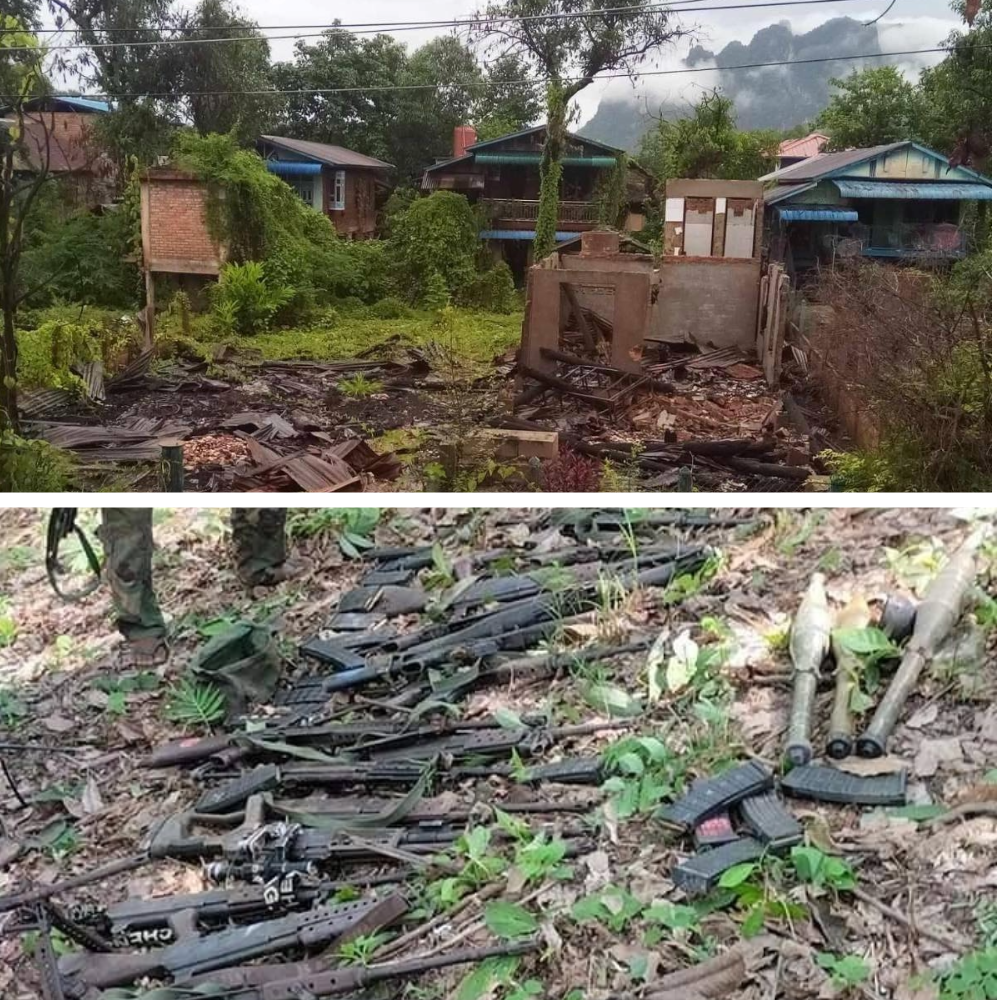Junta Forces Coerce Villagers in Kyaikmayaw Township to Return to Mine-Contaminated Areas Ahead of Planned Elections
November 7, 2025
HURFOM: As the junta prepares for the first phase of its planned elections in roughly 50 days, Junta units have begun forcing displaced residents to return to several villages in southeastern Kyaikmayaw Township, including Chaung-Hna-Kwa, Hlwa-Sin-Gone, and Kyon-Kwe, that were devastated by conflict and remain contaminated with landmines and unexploded ordnance.
Local people say the troops are trying to make these once-deserted areas appear “normal and repopulated” before the election. However, the Junta has done little to clear the weapons littering the ground, and residents are being ordered back to homes surrounded by silent, deadly explosives.

Decades of conflict in southeastern Burma have left behind a deadly legacy. Landmines and unexploded ordnance can remain active for decades, posing an invisible threat to civilians who return to their fields, fetch water, or simply walk to their homes. They do not distinguish between civilians and combatants, and many of the victims are children.

In areas like Kyaikmayaw, fatal accidents occur frequently when villagers resume daily activities such as farming or collecting firewood. The fear of an explosion has also caused deep psychological trauma, leading to anxiety, depression, and post-traumatic stress disorder (PTSD) among residents.
“Every time I walk to the well, I am terrified,” said a woman from Hlwa-Sin-Gone Village, her voice trembling. “We hear that the soldiers cleared the roads, but we still see signs that warn us not to touch anything. My husband doesn’t let the children go outside. We are living with fear every minute.”

A farmer from Kyon-Kwe Village added, “We came back because the army said it was safe, but people are still getting hurt. Two cows died when they stepped on something in the field. I don’t know what will happen to us. We can’t farm, and we can’t move freely. We feel trapped.”
Residents told HURFOM that the Junta’s return orders are part of a broader political strategy to showcase “stability” in time for the upcoming polls. Villagers said soldiers visited displacement camps and nearby shelters, insisting that it was now “safe” to go home, while warning that anyone refusing to return could lose access to future aid or land rights.
“They say it’s peaceful now, but they only cleared the surface,” said a 38 year ole woman from Chaung-Hna-Kwa village. “Unexploded shells and mines are still in our gardens. The soldiers told us to clean up the village so that officials can take pictures. It’s not about helping us, it’s about showing that the election areas are ready.”
Chaung-Hna-Kwa, once home to more than 1,250 households, sits along the main road between Mudon and Thanbyuzayat. The area was heavily contested throughout 2023 when joint resistance forces briefly captured the Attran Bridge checkpoint before the junta reclaimed it with heavy artillery fire. Most villagers fled, and only a few dozen families have cautiously returned.
The military maintains multiple security checkpoints and gates, verifying people’s names against household lists before allowing them inside. Locals describe the village as a “dead zone”, overgrown with grass, houses looted or destroyed, and no sign of meaningful recovery.
Residents told HURFOM that neither the Junta nor international organizations have carried out mine-clearance operations or humanitarian support. Most returning families live under makeshift roofs, surrounded by destroyed farmland and lingering explosives.
“We are being used as proof that life is returning to normal,” said a young mother from Hlwa-Sin-Gone. “But what kind of life is this? We live among death.”
A 29-year-old Mudon resident, who used to serve as a humanitarian aid volunteer, in mid-2024, expressed his concern that ‘the worst part is the lack of real humanitarian support. In Chaung-Hna-Kwa and about five nearby villages, more than 20,000 people still urgently need help. Many of them don’t have proper houses to go back to. Farmland is damaged. Basic things like small roads, water sources, and village infrastructure are also broken.’
He also conveyed the ground realities that people need support to rebuild, shelters, tools, food, and some cash to start again. But the Junta is not allowing real CSOs and NGOs, the ones who can actually help, to come in. Instead, the Junta forces block the CSOs, NGOs, and support from the UN Agencies, sometimes even confiscating their supplies.
“What’s more worrying is that the military is keeping those seized items, food and other aid, and may use them later to hand out to people as part of their election campaign. So instead of giving help because people need it, they want to give it only when it benefits them politically.” He said.
HURFOM’s previous documentation from Kyaikmayaw Township shows a consistent pattern of forced returns, extortion, and militarization of civilian areas.
By turning dangerous villages into political showcases, the junta is placing already traumatized communities at further risk while trying to project control ahead of its election. The practice violates both international humanitarian law and fundamental human rights, which prohibit the forced return of civilians to unsafe areas and require adequate mine clearance before resettlement.



















































